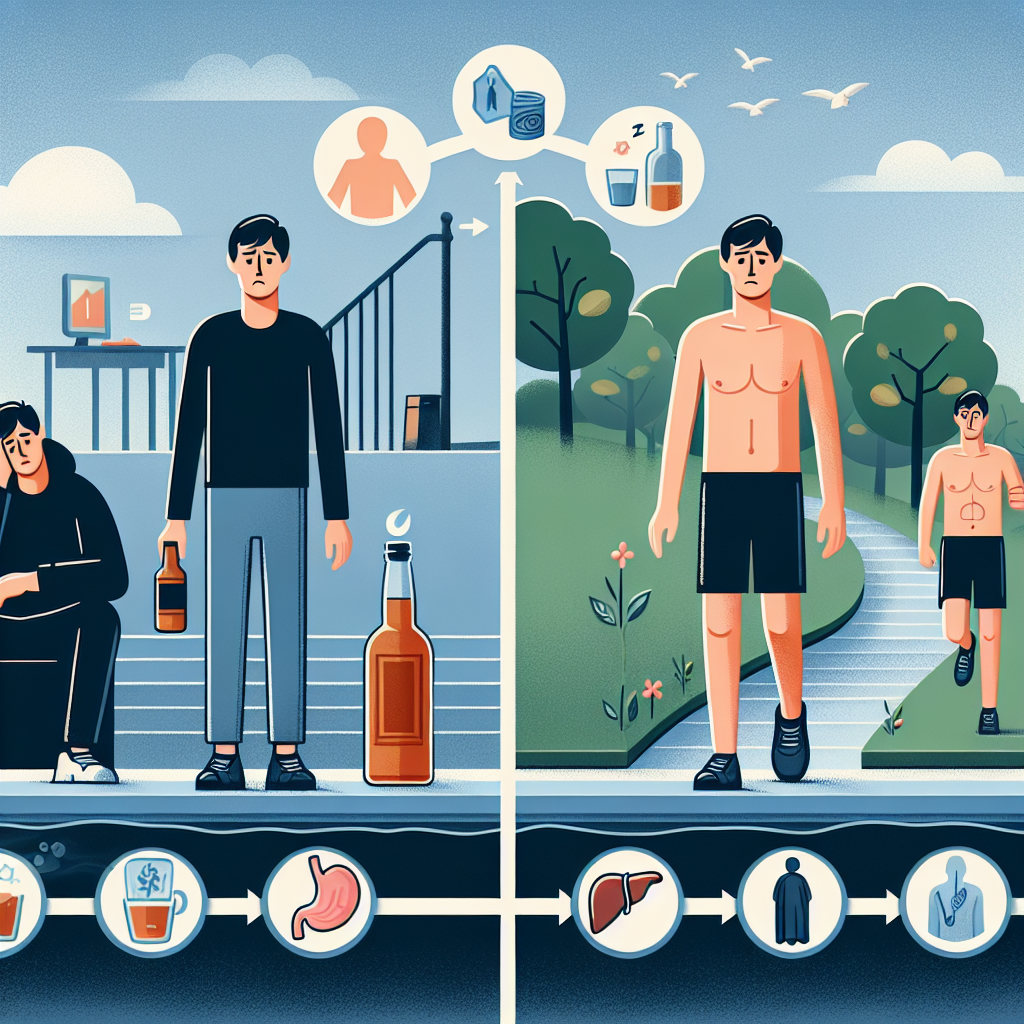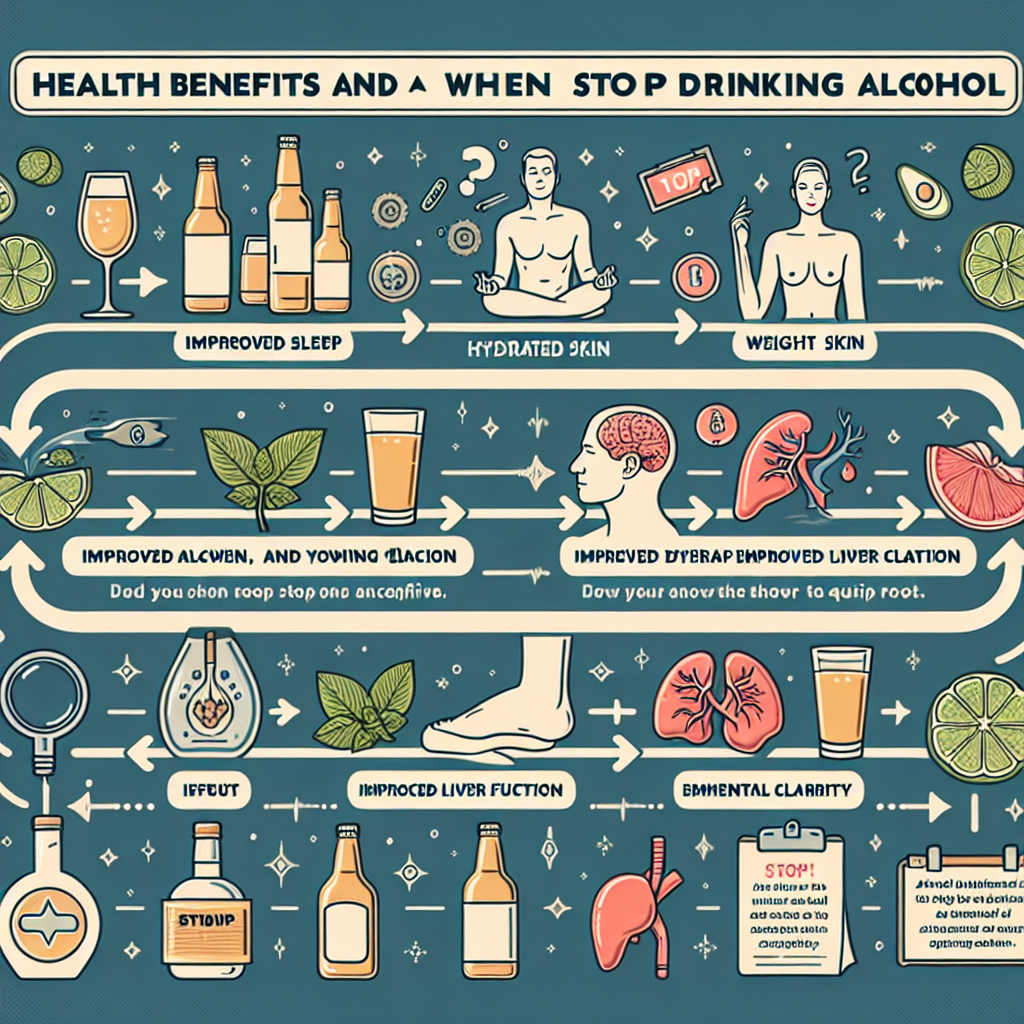-
Table of Contents

“Embrace Clarity, Health, and a New Beginning: Discover Life Beyond Alcohol”
Introduction
When you stop drinking alcohol, you can expect a range of physical, mental, and emotional changes. Initially, you may experience withdrawal symptoms such as anxiety, irritability, tremors, and cravings, which can vary in intensity depending on the level of alcohol dependence. As your body adjusts, you will likely notice improvements in sleep quality, energy levels, and overall physical health. Mentally, you may experience clearer thinking, better concentration, and improved mood stability. Emotionally, you might find a greater sense of well-being and reduced feelings of depression and anxiety. Socially, you may need to navigate changes in your relationships and social activities, as alcohol often plays a significant role in social interactions. Long-term benefits of quitting alcohol include a lower risk of developing chronic diseases, improved liver function, and enhanced mental health. Overall, stopping alcohol consumption can lead to a healthier, more balanced lifestyle.
Physical and Mental Health Benefits of Quitting Alcohol
When you decide to stop drinking alcohol, you embark on a journey that can significantly transform both your physical and mental health. The benefits of quitting alcohol are numerous and can be felt almost immediately, as well as in the long term. Initially, you may notice improvements in your sleep patterns. Alcohol is known to disrupt the sleep cycle, leading to poor quality rest. Once you eliminate alcohol from your system, you may find that you fall asleep more easily and wake up feeling more refreshed and energized.
As you continue on this path, your physical health will begin to show marked improvements. One of the first changes you might observe is in your skin. Alcohol dehydrates the body, which can lead to dry, dull skin and exacerbate conditions like acne and rosacea. By quitting alcohol, your skin will start to regain its natural moisture and elasticity, giving you a healthier, more radiant appearance. Additionally, your liver, which works tirelessly to process and detoxify alcohol, will begin to repair itself. This can lead to better liver function and a reduced risk of liver diseases such as cirrhosis and fatty liver.
Moreover, your immune system will get a significant boost. Alcohol weakens the immune system, making you more susceptible to infections and illnesses. By removing alcohol from your life, your body can better defend itself against pathogens, leading to fewer sick days and a generally healthier you. Your cardiovascular health will also benefit. Alcohol consumption is linked to high blood pressure, heart disease, and stroke. Quitting alcohol can help lower your blood pressure and reduce your risk of these serious health issues.
Transitioning to the mental health benefits, you will likely experience a clearer mind and improved cognitive function. Alcohol can impair brain function, affecting memory, concentration, and decision-making abilities. As you abstain from drinking, you may find that your mental clarity improves, making it easier to focus on tasks and think critically. This newfound mental sharpness can enhance your productivity and overall quality of life.
Furthermore, your emotional well-being will see positive changes. Alcohol is often used as a coping mechanism for stress, anxiety, and depression, but it can actually exacerbate these conditions in the long run. By quitting alcohol, you give yourself the opportunity to develop healthier coping strategies and build emotional resilience. You may find that your mood stabilizes, and you experience fewer mood swings and episodes of anxiety or depression.
Socially, you might notice an improvement in your relationships. Alcohol can sometimes lead to conflicts and misunderstandings with loved ones. By removing alcohol from the equation, you can communicate more effectively and build stronger, more meaningful connections with those around you. Additionally, you may find that you have more time and energy to invest in hobbies and activities that bring you joy and fulfillment.
In conclusion, the decision to stop drinking alcohol can lead to a multitude of physical and mental health benefits. From improved sleep and skin health to enhanced cognitive function and emotional well-being, the positive changes you experience can be life-changing. Embracing a life without alcohol opens the door to a healthier, happier, and more fulfilling existence. As you navigate this journey, remember that each step forward is a testament to your strength and commitment to a better you.
Social and Emotional Changes After Stopping Alcohol Consumption
When you decide to stop drinking alcohol, the journey ahead is filled with numerous social and emotional changes that can significantly impact your life. Initially, you might feel a sense of apprehension about how this decision will affect your relationships and social interactions. However, as you navigate through this transformative period, you will likely discover a newfound clarity and emotional stability that can enhance your overall well-being.
One of the first social changes you may notice is a shift in your social circle. Friends who were primarily drinking buddies might become less prominent in your life. This can be challenging, as it may feel like you are losing connections. However, this shift also opens the door to forming deeper, more meaningful relationships with individuals who support your decision and share similar values. As you engage in activities that do not revolve around alcohol, you will find yourself meeting new people who contribute positively to your life.
In addition to changes in your social interactions, you will experience significant emotional shifts. Initially, you might feel a sense of vulnerability as you confront emotions that were previously numbed by alcohol. This can be overwhelming, but it is also an opportunity for growth. By facing these emotions head-on, you develop a stronger sense of self-awareness and emotional resilience. Over time, you will find that you are better equipped to handle stress and navigate life’s challenges without relying on alcohol as a crutch.
Moreover, stopping alcohol consumption often leads to improved mental health. Many people report a reduction in symptoms of anxiety and depression after quitting drinking. This is partly because alcohol is a depressant that can exacerbate mental health issues. As your body and mind adjust to a life without alcohol, you will likely experience a more stable and positive mood. This emotional stability can enhance your relationships, as you become more present and engaged with those around you.
Another significant emotional change is the increase in self-esteem and self-worth. When you stop drinking, you are making a conscious decision to prioritize your health and well-being. This act of self-care can boost your confidence and help you develop a more positive self-image. As you achieve milestones in your sobriety journey, you will feel a sense of accomplishment that reinforces your commitment to a healthier lifestyle.
Furthermore, your ability to communicate effectively will improve. Alcohol often impairs judgment and can lead to misunderstandings and conflicts in relationships. Without the influence of alcohol, you will find that your interactions are more genuine and constructive. This improved communication fosters stronger connections and helps you build a supportive network of friends and family.
As you continue on this path, you will also notice an increase in your overall energy and motivation. Alcohol can drain your energy and leave you feeling lethargic. By eliminating it from your life, you will experience a renewed sense of vitality that allows you to pursue your passions and interests with greater enthusiasm. This newfound energy can lead to personal growth and the discovery of new hobbies and activities that bring joy and fulfillment.
In conclusion, stopping alcohol consumption brings about profound social and emotional changes that can transform your life for the better. While the journey may have its challenges, the rewards are immense. By embracing these changes, you will develop deeper connections, improved mental health, and a stronger sense of self-worth. This inspirational journey is a testament to the power of making positive choices and the incredible impact they can have on your overall well-being.
Q&A
1. **Question:** What are some physical benefits you might experience when you stop drinking alcohol?
**Answer:** Some physical benefits include improved liver function, better sleep quality, weight loss, lower blood pressure, and enhanced immune system function.
2. **Question:** What are some psychological benefits you might experience when you stop drinking alcohol?
**Answer:** Psychological benefits can include reduced anxiety and depression, improved mood stability, better cognitive function, and increased mental clarity.
Conclusion
When you stop drinking alcohol, you can expect a range of physical, mental, and emotional changes. Physically, you may experience improved liver function, better sleep, weight loss, and enhanced overall health. Mentally, you might notice increased clarity, better focus, and improved mood stability. Emotionally, you could feel a greater sense of well-being and reduced anxiety or depression. Socially, you may find new ways to connect with others and enjoy activities without alcohol. However, the initial period may involve withdrawal symptoms and cravings, which can be challenging but typically subside with time. Overall, quitting alcohol can lead to significant improvements in quality of life and long-term health benefits.



